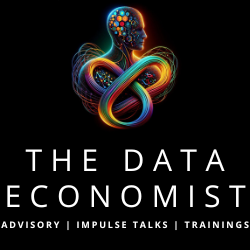Warum das Hub & Spoke Model eine gute Idee ist die Organisation zur einer Data Inspired Culture zu transformieren.
In der digitalen Transformation gewinnt das Datenmanagement zunehmend an Bedeutung, als Voraussetzung einer erfolgreichen Nutzung von Data Analytics und AI. Doch wie wird eine Organisation wirklich "Data Inspired"? Ein erfolgversprechender Ansatz ist das Hub & Spoke Model, das Unternehmen hilft, dateninspiriert zu agieren und gleichzeitig die Reife der Organisation schrittweise zu entwickeln, ohne die Menschen und Organisation zu überfordern. In diesem Artikel beleuchte ich, wie das Hub & Spoke Model als Entwicklungshelfer zur Data Inspired Company fungiert und wie es Sie auf dem Weg zu einer crossfunktionalen und agilen dateninspirierten Organisation unterstützt.
Wie der Data Mesh Ansatz die Logistikbranche unterstützen kann sich zur Data Insights Driven Company zu transformieren.
Data Mesh ist ein innovativer Organisations-Ansatz in der Welt der Datenverarbeitung und -verwaltung, der sich in den letzten Jahren zunehmender Aufmerksamkeit erfreut. Dieser Ansatz soll den wachsenden Herausforderungen bei der Skalierung von Daten-Analysen und -Produkten in Unternehmen gerecht werden. Er setzt auf eine dezentrale, domänenspezifische Datenverantwortlichkeit und adressiert Probleme, die in traditionellen zentralisierten Datenarchitekturen auftreten. Im Folgenden werden die vier grundlegenden Prinzipien des Data Mesh Ansatzes erläutert, gefolgt von einer Diskussion darüber, warum dieser Ansatz besonders in der Logistikbranche von großem Nutzen sein kann.
Der Data Catalog 2.0 als wesentlicher Baustein der Self-Serve Data & Analytics Plattform und einer nachhaltigen Data-Mesh Infrastruktur
Das Konzept eines „Data Mesh Ökosystems“ als Zielbild im Rahmen einer Transformationen zu einer „Data Inspired Human Culture“ gewinnt zunehmend an Bedeutung in der modernen Datenverwaltung und -analyse. Es befürwortet einen dezentralen Ansatz in der Datenarchitektur und im organisatorischen Design gepaart mit einer Zentralen Self Serve Data & Analytics Plattform. Ein Data Mesh betont die dezentrale Datenverantwortungs- und Architekturstruktur, die auf spezifischen Domänen beruht, wobei domänenspezifische Daten zu wertorientierten Datenprodukten entwickelt und vermarktet werden, und somit als Produkt im Vordergrund stehen. Der Data Catalog spielt in diesem Ökosystem eine wesentliche Rolle, die eine effiziente Selbstbedienung und -Publizierung auf Datenplattformen ermöglicht.
Warum datengetriebene Entscheidungsfindung und Datenprodukte für Unternehmen wettbewerbsentscheidend sind.
In der heutigen Geschäftswelt ist die Bedeutung von Daten nicht mehr zu übersehen. Daten sind das Lebenselixier moderner Unternehmen und bilden die Grundlage für Wettbewerbsvorteile, verbesserte Kundenerlebnisse und bahnbrechende Innovationen. Ein umfassendes Verständnis für die Bedeutung einer datengetriebenen Kultur und der Wert von Datenprodukten ist daher entscheidend. Eine datengetriebene Kultur kann dabei helfen, faktenbasierte Entscheidungen zu treffen und die betriebliche Effizienz zu steigern, während das Denken in Datenprodukten Unternehmen erlaubt, ihre Datenressourcen effektiv zu monetarisieren und nachhaltigen Mehrwert zu schaffen. Nachfolgend beleuchte ich die Vorteile und Charakteristika dieser Aspekte in 3 Teilen.
Why a data governance-oriented data fabric is essential for scalable qualitative Data & AI Products
Modern process approaches, agile working, cloud technologies and AI offer new opportunities
In our data-driven world, qualitative data products are key to business success. But scaling such products efficiently requires a robust data infrastructure. This is where the data fabric comes in. A successively (agilely) built, data governance-oriented data fabric ensures that data quality, protection and use are at the centre of all efforts.
Data Literacy has to emerge outside the bubble, otherwise it won't work out with the Data Driven Company!
Lately, I've been getting the feeling that we data experts live in a bubble. More and more often I hear that we would like to become data driven, but the others just don't understand us. But isn't it up to us to communicate our knowledge in such a way that others understand us? It's often very much about technology and what technology can do. We also talk about how technology will change our lives and cost jobs. Sometimes we even make fun of exciting technology or how stupid it actually is, as in the case of Chat GPT. Everything is somehow negative. Shouldn't we talk about it in a more positive way and what all becomes possible when we draw the right path and how it can help us? I often take two guiding principles to heart.
Why the hub & spoke model is a good idea to transform an organization into a data-inspired culture.
In the digital transformation, data management is becoming increasingly important as a prerequisite for the successful use of data analytics and AI. But how does an organization become truly “data inspired”? A promising approach is the Hub & Spoke Model, which helps companies to act in a data-inspired way while gradually developing the maturity of the organization without overwhelming people and organization. In this article, I will discuss how the Hub & Spoke Model can help you become a Data Inspired Company and how it can support you on your way to becoming a cross-functional and agile data-inspired organization.
Why data driven decision making and data products are critical for businesses to compete.
In today's business world, the importance of data can no longer be overlooked. Data is the lifeblood of modern businesses and is the foundation for competitive advantage, improved customer experiences and breakthrough innovation. A comprehensive understanding of the importance of a data-driven culture and the value of data products is therefore crucial. A data-driven culture can help make fact-based decisions and increase operational efficiency, while thinking in terms of data products allows companies to effectively monetise their data assets and create sustainable value. Below, I highlight the benefits and characteristics of these aspects in 3 parts.
